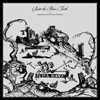 This year, when playing with United Bible Studies or Che Chen and Robbie Lee, Jozef van Wissem's name has taken the spotlight, even though his collaborators have made essential contributions to his music. That's reasonable enough, especially in light of Jozef's aspirations for the lute and the excellent solo records he's released throughout 2011. It's worth noting, then, that the Smegma moniker comes before Jozef's name on Suite the Hen's Teeth. Irreverent at times, but absolutely in tune with van Wissem's theoretical desires, Ju Suk Reet Meate is perhaps the best partner Jozef has yet engaged. In fact, Meate is more a foil than a collaborator, challenging van Wissem's palette rather than bending to his baroque will.
This year, when playing with United Bible Studies or Che Chen and Robbie Lee, Jozef van Wissem's name has taken the spotlight, even though his collaborators have made essential contributions to his music. That's reasonable enough, especially in light of Jozef's aspirations for the lute and the excellent solo records he's released throughout 2011. It's worth noting, then, that the Smegma moniker comes before Jozef's name on Suite the Hen's Teeth. Irreverent at times, but absolutely in tune with van Wissem's theoretical desires, Ju Suk Reet Meate is perhaps the best partner Jozef has yet engaged. In fact, Meate is more a foil than a collaborator, challenging van Wissem's palette rather than bending to his baroque will.
On A Prayer for Light, Jozef tried baptizing his lute in the 21st century by keeping its presence simultaneously muted and conspicuous. Many of the strategies that made his solo efforts great were present, but they weren't privileged with the same space and reverence as on The Joy That Never Ends or Ex Patris. Instead, they were supplemented by other unusual instruments and strange phrases, which sometimes worked to highlight the lute's relatively simple textures and statements, but also transcended them. Still, even if Robbie Lee and Che Chen added much of the heresy to Jozef's free spirit, van Wissem's contributions held everything together thematically: the lute remained the star of the show.
That's not so true on Suite the Hen's Teeth. Jozef remains focused on rhythmic and melodic gravity, but this time that gravity is twisted and warped by Meate's unrepentant utterances, which all but ignore the lute's stately forms. At first, the mix of electric sounds and spliced together noises that Meate produces synchronizes perfectly with the palindromic plodding of van Wissem's lute, but as the record progresses, that accord breaks down.
Instead of holding Meate's bird sounds, vibraphones, and brass vibrations together, Jozef's lute bends to the point of breaking. With each passing minute, the music becomes more improvised, a process that culminates with "L’Air Américaine" and "Courante la Pommme d’Or." On both songs, van Wissem is forced to respond to Smegma's omnipresent onslaught of free-associative electronics with something other than the usual deconstructed lute phrases.
That description makes the music sound noisier and more cluttered than it actually is. The amount of space both performers give to their sounds is worth noting, and it helps make sense of the language they develop over the course of the record. Rather than compete with one another, they begin to share sonic nuances. At one point, Jozef manipulates his lute so that it sounds like a sped up tape machine, and it's not clear whether Jozef is playing the lute at all, or Smegma is altering it via his electronics.
If this sounds somewhat similar to A Prayer for Light, that's because both albums share the same basic form. There's an exposition of basic ideas, and then a whole lot of development based on varied textures and unexpected tangents. On Suite the Hen's Teeth, developing new reactions and creative exchanges are given priority over the instrumentation itself, and by the time the album ends, Jozef's lute has disappeared almost completely into an environment populated by constantly shifting instrumentation and improvised phrases.
If, initially, both musicians sound as though they're merely performing together, by the end of the album they've become extremely sensitive to each other; they exhibit a dynamic sympathy that depends on genuine communication, and not just on mutual soloing or predetermined forms. Each player's awareness of the other might read like an insignificant detail on paper, but on record it makes a tremendous difference.
samples:
- This is a vinyl-only release, so there are no samples. My apologies.
 
Read More


